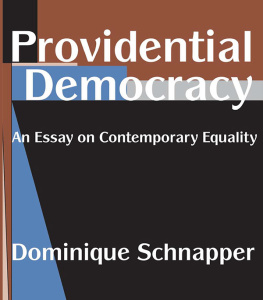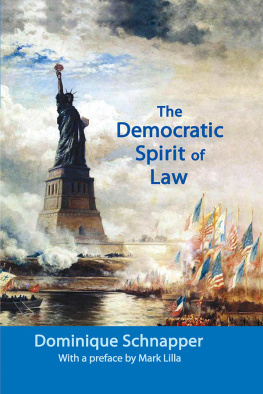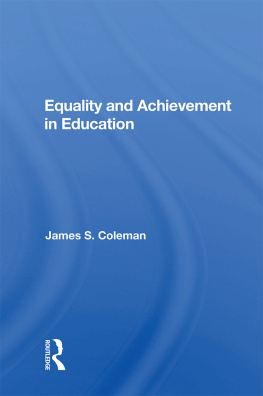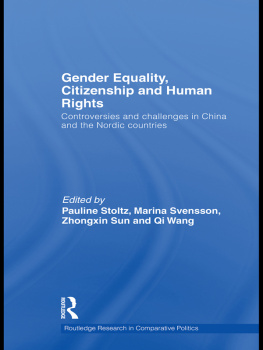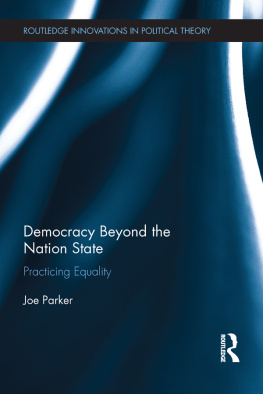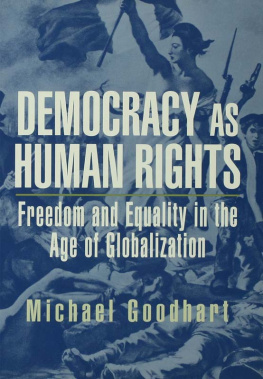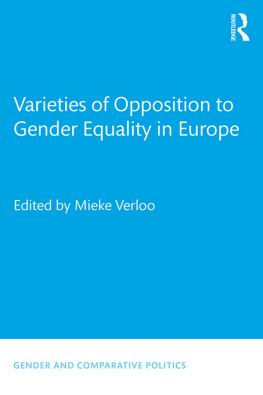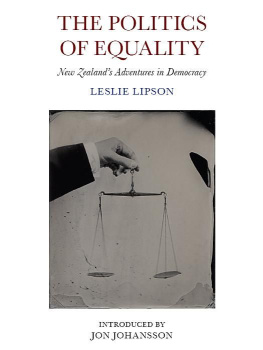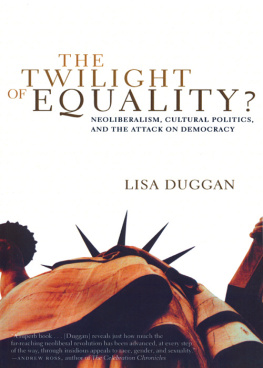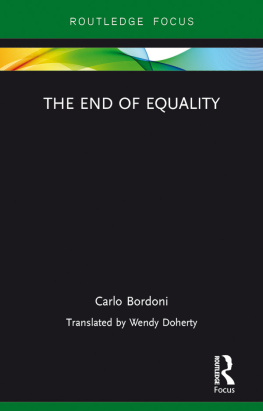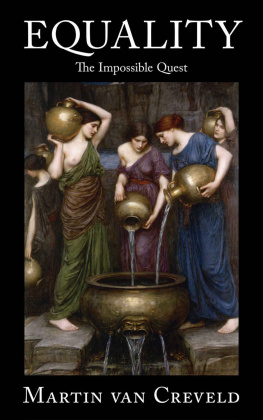Originally published in French by Editions Gallimard, Editions Gallimard, Paris, 2002.
Published 2009 by Transaction Publishers
Published 2017 by Routledge
2 Park Square, Milton Park, Abingdon, Oxon OX14 4RN
711 Third Avenue, New York, NY 10017, USA
Routledge is an imprint of the Taylor & Francis Group, an informa business
English-language copyright 2006 by Dominique Schnapper.
All rights reserved. No part of this book may be reprinted or reproduced or utilised in any form or by any electronic, mechanical, or other means, now known or hereafter invented, including photocopying and recording, or in any information storage or retrieval system, without permission in writing from the publishers.
Notice:
Product or corporate names may be trademarks or registered trademarks, and are used only for identification and explanation without intent to infringe.
Library of Congress Catalog Number: 2008035479
Library of Congress Cataloging-in-Publication Data
Schnapper, Dominique.
[Dmocratie providentielle. English]
Providential democracy : an essay on contemporary equality / Dominique Schnapper.
p. cm.
Includes bibliographical references and index.
ISBN 978-1-4128-0869-9 (alk. paper)
1. EqualityHistory--20th century. 2. DemocracyHistory20th century. I. Title.
JC575.S3613 2006b
323.42dc22
2008035479
ISBN 13: 978-1-4128-0869-9 (pbk)
ISBN 13: 978-0-7658-0306-1 (hbk)
This book is dedicated to the memory of my husband, Antoine Schnapper, who shared my lifeits joys and ordeals for more than forty-five years.
The gradual development of the principle of equality is a providential fact. It has all the chief characteristics of such a fact: it is universal, it is durable, it constantly eludes all human interference, and all events as well as all men contribute to its progress.
Alexis de Tocqueville
The debates inspired by globalization and by the construction of Europe inevitably provoke thought about the very principles underlying how we live together in democratic societies. On both sides of the Atlantic, an increasing number of books, in political philosophy and the social sciences, deal with the aptness and effectiveness of so-called classical citizenship in an expanding world. Such writers inquire into the means by which all members of a society might be induced to participate in a genuine democratic project, as well as into those by which specific population groups might have their need to be acknowledged fulfilled. To the extent that no coherent critical systems (as was formerly the case with the ideologies of Fascism, Nazism, or Communism) remain directed against what English speakers call liberal societies (in French, this could literally be stated as societies organized by means of citizenship), the problem of adapting traditional citizenship to the needs and demands of homo democraticus has now arisen.
I would like to contribute to this debate by extending the scope of a project begun over a decade ago. My ambition has been to respond, as a sociologist, to problems that have long been formulated by political philosophers; in other words, to base my response on an objective knowledge of modern society, the primary aim of a sociological study. It seems to me that political philosophers often fail to take historical experience sufficiently into account. They of course do not entirely exclude such experience from their purview, indeed in the sense that they themselves are historical individuals who intend to participate in public debates. Yet they do not systematically base their analyses on historical experience. They thus tend to generalize upon their own particular social and political experience, as opposed to relativizing or criticizing it. Yet how can one appraise the appositeness of, say, a Marxist critique of formal freedoms without having knowledge of, and reflecting upon, the experience of societies whose leaders declared such freedoms to be useless or secondary and who claimed to replace them with real freedoms?
If theoretical thinking is to be renewed, it seems to me that a necessary prerequisite lies in the quest of the rational knowledge to which sociology aspires. By means of the factual knowledge provided by sociological studies, sociologists can legitimately test philosophers meditations on democratic society. In any event, the conceptual constructions of political philosophy will never entirely satisfy sociologists, who consider empirical inquiryand, more generally, the learning acquired through sociological research aimed at a rational and critical comprehension of historical societiesto constitute the basis from which they can only then attempt to render human relations intelligible. It is true that, until recently, sociologists have too often been divided into two groups: those who concentrate their efforts on establishing and criticizing the validity of their investigative results, rather than on participating in public debates; and those who restrict themselves to radically denouncing economic-liberal societies, rather than comprehending them. If one wishes to examine what the future holds in store and, in particular, the possibilities of constructing a united Europe, then one must begin with factual knowledge and meditate on what democratic societies have become.
A Sociological Project
The analyses developed in this book thus stem from a strictly sociological project whose essential steps I shall now outline. After investigating the history and processes of integration in French society, and regardless of their social attributes. A democratic nation bases its legitimacy upon this abstract political society, a community of citizens made up of individuals who are free and equal from the civil, juridical, and political standpoint. This community of citizens thereby constitutes at once the principle of political legitimacy and the source of the social bondthe social fabric. That tension arises between the civic principle and the diverse manifestations of ethnicitystemming from historical and religious heritagesis inscribed in this very definition. In each nation-state, what might be called the ethnic dimensions of collective livingthe sharing of the same history, collective mythology, language, and cultureexist side by side with the citizenship principle, which proclaims the political freedom and equality of all citizens. In a democratic nation, an oscillation or a dialectic inevitably arises between political legitimacyfree and equal citizens acting in political life as subjects of abstract rights and the ethnic, historical, or ethnico-religious realities of the society at hand, which is made up of individuals differing in origin, religious faith, and material living conditions.
Having defined and described the ideal-type of the republic (in a national context), I then set forth my thinking on these matters by studying the effects, but also the limits of these effects as well as the lapses in the principles of citizenship, that are revealed by the sociology of interethnic relations. This was the topic of La Relation lautre. Throughout that study, I wanted to show that, even in the longest-standing democracies, the civic principle has never been powerful enough to prevent human beings from identifying with historical or religious particularswhich is legitimate. Yet nor has the civic principle been powerful enough to control prejudice with respect to certain groups of people living within the same political society or to curtail discriminatory practices inherited from the pastboth of which are contrary to collective values. No society is, or can be, purely civic. Religious, ethnic, or historical realitiessome legitimate, others illegitimate because of the civic values at stakepersist or are revived. While references to historical and religious particularisms are both inevitable and desirable as long as they remain compatible with common values pertaining to the freedom and equality of all citizens, the stigmatization of and discrimination against certain groups are directly contrary to the civic principle shaping and structuring collective living. Alongside other striking examples, this was indeed the case in the United States, where blacks were long perceived, not as equals, but rather as descendants of African slaves and discriminated against because of their race; this was also the case in most European nations, where citizenship principles did not eliminate anti-Semitism, even though nearly all Jews behaved as loyal citizens.

